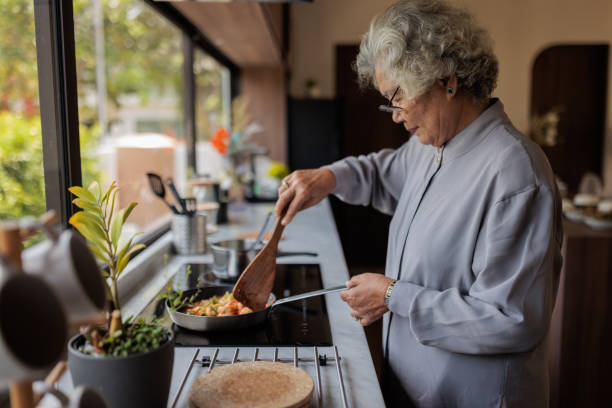In today’s fast-paced world, ensuring that our senior loved ones receive nutritious, well-balanced meals can be a challenge. Optimizing meal prepping for seniors is not just about convenience; it’s a strategic approach to promote their health, independence, and quality of life.
This blog aims to simplify the meal preparation process, making it both manageable and enjoyable, while ensuring that the meals are tailored to meet the unique nutritional needs of the elderly.
Whether you’re a caregiver or a senior looking to make your meal routine more efficient, the forthcoming strategies and tips will empower you to make healthy eating a seamless part of everyday life.
Contents
Key Nutritional Considerations for Seniors
It’s crucial to recognize that as we age, our nutritional requirements evolve. Seniors need a balanced diet rich in vitamins, minerals, fiber, and protein, but with fewer calories to match their lower energy expenditure. Calcium and vitamin D are essential for bone health, while B vitamins are vital for energy metabolism and cognitive function. Hydration is another key aspect, as older adults may not always feel thirsty even when their body needs fluids.
Macronutrient Balance
Protein
Adequate protein intake is imperative for maintaining muscle mass, which tends to decline with age. Including lean meats, plant-based proteins, and dairy products in seniors’ diets can help meet these needs.
Carbohydrates
Opt for whole grains and fiber-rich fruits and vegetables to ensure steady energy levels and promote digestive health. These choices also help to keep blood sugar levels in check.
Fats
Healthy fats, such as those found in avocados, nuts, and olive oil, support brain health and nutrient absorption. It’s important to moderate intake and choose unsaturated fats over saturated and trans fats.
Micronutrient Attention
Seniors are at a higher risk for micronutrient deficiencies, which can impact various aspects of their health. A focus on nutrient-rich foods that are high in vitamins A, C, E, and K, along with minerals like magnesium and potassium, is beneficial. Fortified foods and supplements may also play a role in meeting these dietary needs, though they should be considered carefully and discussed with a healthcare professional.
Incorporating these nutritional considerations into meal prepping for seniors can significantly contribute to their health, vitality, and overall well-being.
Practical Meal-Prepping Tips for Seniors
When it comes to preparing meals for seniors, practicality and nutrition go hand in hand. The aim is not only to simplify the cooking process but also to pack every meal with the necessary nutrients to support their health and well-being.
In this section, we will explore several practical meal-prepping tips that cater specifically to the dietary needs of seniors, ensuring their meals are both delicious and nutritionally complete. From batch cooking to smart food storage, these strategies are designed to make healthy eating easy and sustainable for seniors and their caregivers.
Plan Ahead
One of the most effective strategies for meal prepping is planning meals. Create a weekly menu considering the senior’s preferences, nutritional needs, and any dietary restrictions. This not only helps in shopping for ingredients efficiently but also ensures that meals are varied and balanced throughout the week.
Simplify Cooking Processes

Use of Technology
Leveraging kitchen technology such as slow cookers, pressure cookers, and blenders can simplify the cooking process. These gadgets can help prepare large batches of food with minimal effort, which is particularly helpful for seniors or their caregivers.
Batch Cooking
Preparing meals in batches and storing them in the refrigerator or freezer is a time-saving strategy. Cook once or twice a week and portion meals into individual containers. This approach reduces preparation time and makes it easier for seniors to heat and serve meals independently.
Make Eating a Social Activity
Whenever possible, incorporate social aspects into mealtime. Eating with family or friends can enhance the dining experience for seniors, promoting a more positive attitude towards food and eating. Social interactions during meals can also encourage seniors to eat more and enjoy a varied diet.
Focus on Flavor and Presentation
Seniors may have diminished taste and smell senses, which can affect their appetite and enjoyment of food. Enhancing the flavor of meals with herbs, spices, and healthy sauces, as well as appealingly presenting the food, can make a significant difference in meal enjoyment.
Employing these practical tips in meal prepping for seniors can lead to a more effective, enjoyable, and nutritious eating routine. By focusing on these strategies, caregivers and seniors themselves can ensure that mealtime is both a healthy and pleasurable part of the day.
Leveraging Technology for Nutritional Well-being
In the digital age, technology offers innovative solutions to enhance the nutritional well-being of seniors. From apps that assist with meal planning to platforms that facilitate grocery delivery, leveraging technology can streamline the meal-prepping process, making it more efficient and tailored to the specific needs of the elderly.
This section will explore various technological tools and how they can be integrated into the daily routines of seniors and their caregivers to optimize nutrition and promote healthy eating habits.
Utilizing Apps for Meal Planning and Nutrition Tracking
In the digital age, technology serves as a powerful tool to enhance the nutritional well-being of seniors. Meal planning apps can simplify the process of organizing meals by suggesting recipes and creating shopping lists based on the dietary needs and preferences of the elderly. Nutrition tracking apps can also play a critical role in ensuring seniors are meeting their daily nutritional requirements.
These apps can help track calorie intake, monitor macronutrient balance, and even remind seniors to hydrate regularly. By leveraging these technologies, seniors and their caregivers can maintain a balanced diet more effortlessly.
Online Grocery Shopping and Delivery Services
Another technological marvel that has significantly benefited seniors is online grocery shopping and delivery services. These platforms allow users to purchase groceries without having to leave their homes, a convenience that is especially valuable for those with mobility issues or for caregivers with time constraints.
Online services often have features that facilitate the purchase of healthy foods, such as filtering options for low-sodium, gluten-free, or organic products. This innovation not only promotes physical well-being by ensuring access to nutritious foods but also contributes to seniors’ independence and quality of life.
Educational Resources and Cooking Tutorials
The internet is replete with resources that can educate seniors and their caregivers on various aspects of nutrition and healthy eating. Websites, blogs, and video platforms offer many free cooking tutorials, nutritional advice, and meal prep strategies tailored to the elderly.
These resources can empower seniors to experiment with new recipes, learn about the nutritional value of different foods, and understand how to make healthier food choices. Engaging with these educational materials can also provide inspiration and motivation to maintain a healthy and varied diet.
By incorporating these technological tools and resources into their daily routines, seniors and their caregivers can significantly enhance the nutritional well-being and overall quality of life of the elderly. The digital world offers endless possibilities to support healthful living, and tapping into these resources can make the challenging task of meal prepping for seniors a more manageable and rewarding endeavor.
Conclusion
Preparing meals for seniors may seem like a daunting task, but with the right strategies and resources, it can be both practical and enjoyable. Planning, simplifying cooking processes, making eating a social activity, and focusing on flavor and presentation are all essential factors in meal prepping for the elderly.
Additionally, leveraging technology through apps, online grocery shopping and delivery services, and educational resources can further support the nutritional well-being of seniors. By combining these practical tips and technological tools, caregivers and seniors can ensure a healthy, balanced, and sustainable approach to mealtime that promotes overall wellness in their later years.

